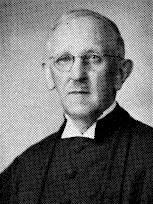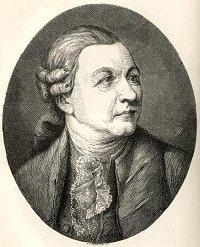Planning worship?
Check out our sister site, ZeteoSearch.org,
for 20+ additional resources related to your search.
- |
User Links
Person Results
Johann Ernst Greding
1676 - 1748 Person Name: J. E. Greding Author of "Der am Kreuz ist meine Liebe" in Die Glaubensharfe (With Melodies)
Johann Ernst Greding
J. C. Aaberg

1877 - 1970 Person Name: Jens Christian Aaberg, b. 1877 Translator of "Print thine image pure and holy" in Service Book and Hymnal of the Lutheran Church in America Jens Christian Aaberg (b. Moberg, Denmark, 1877; d. Minneapolis, MN, 1970) immigrated to the United States in 1901. Educated at Grand View College and Seminary in Des Moines, Iowa, he entered the ministry of the Danish Evangelical Lutheran Church in America and served congregations in Marinette, Wisconsin; Dwight, Illinois; and Minneapolis, Minnesota. Aaberg wrote Hymns and Hymnwriters of Denmark (1945), translated at least eighty hymns from Danish into English, and served on four hymnal committees. In 1947 King Frederick of Denmark awarded him the Knight Cross of Denmark.
--Psalter Hymnal Handbook, 1987
J. C. Aaberg
Jacobus Fabricius
1593 - 1654 Person Name: J. Fabricius Author of "Heilger Gott, der du begehrest" in Evangelisches Gesangbuch mit vierstimmigen Melodien Fabricius, Jacob, a chaplain in the army of Gustavus Adolphus, was born in 1593, and died in 1654. There is some doubt as to the authorship of the hymn here credited to him. Some hymnologists have attributed it to Johann Michael Altenburg (1584-1640), a preacher, teacher, and musician of Erfurt, and others attribute it to Gustavus Adolphus. "Fear not, O little flock, the foe." 445
Hymn Writers of the Church, 1911 by Charles Nutter
=================
Born: July 19, 1593 - Köslin (Pommern)
Died: August 11, 1654 - Stettin
The Lutheran theologian, Jakob Fabricius, was a son of a shoemaker.
Since 1620 Fabricius was the preacher of the Duke Bogislaw XIV von Pommern. In 1626 he attained a doctorate in theology in Greifswald. In January 1631 the Duke Gustav Adolf appointed Fabricius as his preacher. As a preacher and a priest Fabricius accompanied the King Gustav Adolf on his travels in Germany. After the death of the King in November 16, 1632, in the battle with Lützen, Fabricius stepped again into the service of the Duke of Pommern and became in 1634 Superintendent for Eastern Pomerania.
Disputed is the question whether Fabricius or Michael Altenburg were the poet of the song "Verzage nicht, du Häuflein klein!".
--www.bach-cantatas.com/
Jacobus Fabricius
Friedrich Gottlieb Klopstock

1724 - 1803 Author of "Wenn ich einst von jenem Schlummer" in Schulgesangbuch für höhere Lehranstalten (Ausgabe für Rheinland und Westfalen) Klopstock, Friedrich Gottlieb, the eldest of the 17 children of Gottlob Heinrich Klopstock (then advocate and commissionsrath at Quedlinburg, and after 1735 amtmann at Friedeburg, on the Saale, near Halle), was born at Quedlinburg, July 2, 1724. From 1739 to 1745 he attended the famous school at Schulpforte, near Naumburg (where he conceived the first idea of his Messias); then he entered the University of Jena, in the autumn of 1745, as a student of theology, and the University of Leipzig at Easter, 1746. At Leipzig he made acquaintance with J. A. Cramer (q.v.); and became one of the contributors to the Bremer Beiträge, in which the first three books of his Messias appeared. In 1748 he became tutor in the house of a merchant named Weiss at Langensalza; and in 1750 accepted an invitation to visit Zurich (the literary capital of Switzerland), where his Messias had been received with great enthusiasm. He was then, in the spring of 1751, invited by the Danish prime minister, Count von Bernstorff, to take up his residence at the Court of King Frederick V., at Copenhagen, in order to be able to finish his Messias free from the cares of a profession; and was, in 1763, appointed Legationsrath. After the Count ceased, in the end of 1770, to be prime minister, Klopstock retired to Hamburg, in 1771, on a pension. The rest of his life was passed mainly at Hamburg, except about a year spent at Carlsruhe, at the Court of the Margave Carl Friedrich of Baden, who appointed him Hofrath. He d. at Hamburg, March 14, 1803, and was buried with civic honours on the 22nd, under a lime-tree in the churchyard at Ottensen (Koch, vi. 322; Allg. Deuteche Biog., xvi, 291, &c).
Klopstock ranks among the classic poets of Germany. In his Oden (collected at Hamburg, 1771; enlarged, Leipzig, 1798; finally enlarged, Leipzig, 1804) he is seen at his best; his earlier compositions of this class being the finest modern examples for perfection of form, lyric grace, majesty, and purity of rhythm. His most famous work is his Messias, which on its first appearance created an enthusiasm such as had not been awakened by any German work for centuries. It was suggested by Milton's Paradise Lost, but Milton's calm majesty, firmness of touch, and unity of action were all foreign to Klopstock's nature—his genius was lyric rather than epic. With all its defects of style and construction, it is still a noble work, and could only have been written by a true poet and a sincere Christian; though to us its interest perhaps consists as much in its historical importance and results as in its intrinsic merits. (Books 1-3 written in prose at Jena, and then in hexameter verse at Leipzig, and first pub. in the Neue Beyträge, Bremen, 1748. Books 1-3 revised, and 4, 5 added at Halle, 1751; 6-10 added in the Copenhagen ed., 1755; 11-15, Copenhagen, 1768; 16-20, Halle, 1773. Finally revised ed. in 4 vols., Leipzig, 1800.)
In his hymns Klopstock is not seen at his best. He seems to have had little apprecia¬tion of the requirements which the writer of hymns for use in public worship has to meet. His hymns are emotional and subjective, little suited to congregational tunes, and not sufficiently simple in style. In his first collection (1) Geistliche Lieder, Copenhagen, 1758, he included a number of indifferent recasts of earlier German hymns; his second collection (2) Geistliche Lieder, Copenhagen, 1769, consists entirely of original compositions. The only one of his hymns which is still much used in Germany is "Auferstehn, ja auferstehn, wirst du" (q.v.). The others which have passed into English common use are:—
i. Deine heilige Geburt. Supplication. In his Geistliche Lieder, 1758, p. 44, in 141, repeated in Knapp's Evangelischer Lieder-Schatz, 1837, No. 468. Translated as "Saviour! by Thy holy birth," by Dr. W. L. Alexander, in 2 stanzas of 8 lines. It was written about 1830, but 1st published in the 2nd ed., 1858, of his Selection of Hymns, No. 339, entitled "Christ's aid invoked."
ii. Herr, du wollst sie vollbereiten. Holy Communion. In his Geistliche Lieder, 1758, p. 135, arranged for antiphonal singing by choir and congregation. The form translated into English is "Herr, du wollst uns vorbereiten," being the first two stanzas for choir altered as No. 246 in the Württemberg Gesang-Buch, 1842, in 2 stanzas of 12 lines. Translated as "Grant us, Lord! due preparation," by L. Heyl, in the Ohio Lutheran Hymnal, 1880. Another tr. is, "O God, do Thou Thy folk prepare," by Dr. G. Walker, 1860, p. 64.
iii. Nicht nur streiten, überwinden. Christian Warfare. 1st pub. in the G. B. für St. Petri Kopenhagen, 1760, No, 639; repeated in his Geistliche Lieder, 1769, p. 23, in 5 stanzas of 8 lines, entitled "The Victory of the Faithful." In the Berlin Geistliche Leidersegen, ed. 1863. Translated as “Labour ever, late and early," a full but rather free tr. by Dr. Kennedy, in his Hymnologia Christiana, 1863.
iv, Zeige dich uns ohne Hülle. Sunday. In his Geistliche Lieder, 1769, p. 88, in 4 stanzas of 8 lines, entitled “Preparation for Divine Service." Included in the Berlin Geistliche Leidersegen, ed. 1863. It is the only hymn by Klopstock much used in English. Translated as "Lord, remove the veil away," a good and full tr. by Miss Borthwick,in Hymns from the Land of Luther, 3rd Ser., 1858, p. 47 (1884, p. 168). Included in full in Kennedy, 1863; Eng. Presbyterian Psalms & Hymns, 1867; Temple Hymn Book, 1867; Dale's English Hymn Book, 1875, and others. It is abridged in W. F. Stevenson's Hymns for Church & Home, 1873, Laudes Domini, N. Y., 1884, and others.
Hymns not in English common use:--
v. Ach wie hat mein Herz gerungen. Strength in Weakness. 1769, p. 101, in 10 stanzas, Translated as “Ah me, what woes this heart have wrung," by J. Sheppard, in his Foreign Sacred Lyre , 1857, p. 68.
vi. Du wollst erhoren Gott, ihr Flehn. For the Dying . 1758, p. 73, in 11 stanzas. The form translation is the recast (probably by J. S. Diterich), as No. 120, in the Berlin Gesang-Buch 1765, beginning "Dein sind wir Gott! in Ewigkeit." Translated as "We're Thine, O God, for evermore," by Dr. H. Mills, 1845 (1856, p. 241).
vii. Selig sind des Himmels Erben. For the Dying; or, At Funerals. 1758, p. 15, in 4 pts., arranged for choir and congregation, in all 10 stanzas. Founded on Rev. xiv. 13. Sung at the funeral of J. C. Lavater, January 4, 1801. Translated as "Blessed are the heirs of heaven," by G. Moultrie, in his Hymns & Lyrics, 1867, p. 337.
viii. Starke, die zu dieser Zeit. For the Dying , 1758, p. 1, in 3 stanzas. Translated as "Strengthen, Lord, the weary soul," by G. Moultrie, in his Hymns & Lyrics , 1867, p. 355, marked as an "orison for the departing spirit."
ix. Um Erden wandeln Monde. The Lord's Prayer. In his Oden, vol. ii., Leipzig, 1798, p. 119, marked as written in 1789, and entitled "Psalm." It is an ode of 58 lines, embodying and amplifying the Lord's Prayer. Sung at his own funeral. Translated as, (1) "Moons round their planets roll," by J. Sheppard, 1857, p. 46. (2) "Round their planets roll the moons," by Miss Winkworth, 1869, p. 332.
x. Wenn ich einst von jenem Schlummer. Morning. 1769, p. 57, in 3 stanzas. In the Württemberg Gesang-Buch, 1842, No. 562. The translations are, (1) "When I rise again to life," by W. Nind, in his Odes of Klopstock, 1848, p. 307. (2) "When I wake from out that slumber," in A. Baskerville's Poetry of Germany, 1854, p. 39, repeated in the Schaff-Gilman Library of Religious Poetry, ed. 1883, p. 282. (3) "Father, let no day to come" (the text used begins with stanza ii. altered to "Gieb dass keiner meiner Tage"), by J. Sheppard, 1857, p. 88. (4) "Since I one day from yonder sleeping," by Miss Warner, 1869, p. 40.
xi. Zitternd freu ich mich. The Vision of God. First published in the Nordische Aufselier ed. by J. A. Cramer, vol. ii. (Kopenhagen, 1760). In his Oden, Hamburg, 1771, p. 25, in 90 lines, and marked as written in 1759. Translated as, (1) "With trembling I rejoice," by W. Nind, 1848, p. 130. (2) "I joy, but tremblingly," by J. Sheppard, 1857, p. 24. (3) "Trembling I rejoice," by Miss Winkworth, 1869, p. 329.
Besides the above a considerable number of Klopstock's Oden are translated by J. Sheppard in his Foreign Sacred Lyre, 1857. A full selection from the Oden appeared as Odes of Klopstock from 1747 to 1780. Translated from the German by William Nind , London, W. Pickering, 1848. [Rev. James Mearns, M.A.]
--John Julian, Dictionary of Hymnology (1907)
Friedrich Gottlieb Klopstock
Johann Gottfried Hermann
1707 - 1791 Person Name: J. G. Hermann Author of "Kommt, ihr Menschen! laßt euch lehren" in Gesangbuch der Evangelischen Gemeinschaft Herrmann, Johann Gottfried, D.D., son of Gottfried Herrmann, pastor at Altjessnitz, near Bitterfeld, Saxony, was born at Altjessnitz, Oct. 12, 1707. After studying at the University of Leipzig (M.A. in 1731), he was appointed in 1731 diaconus at Ranis, near Neustadt on the Orla; in 1734 diaconus at Pegau, near Leipzig; in 1738 superintendent at Plauen; and in 1746 chief Court preacher at Dresden, and oberconsistorialrath. He died at Dresden, July 30, 1791 (Koch, v. 503-505). The only hymn by him translated into English appeared in the Privilegirte neue und vollständige Voigtländische Gesang Buch, Plauen, 1742, which he edited while Superintendent at Plauen. It is:
Gent hin, ihr glaubigen Gedanken. The Love of God. A fine hymn, founded on Eph. i. 3-12, on Faith produced and nourished by the everlasting love of God. 1st pub. 1742 as above (ed. 1751, No. 843), in 14 stanzas of 6 lines, entitled "On the Everlasting Love of God." Included as No. 413 in the Unverfälschter Liedersegen 1851. The only translation in common use is:—
On wings of faith, ye thoughts, fly hence. A good tr., omitting stanza viii., by Miss Winkworth, in the 1st Ser. of her Lyra Germanica, 1855, p. 121. Her translation of lines 1-4 of stanzas v., xii., x., xi. beginning "Ah! happy hours! whene'er upsprings," with a 5th stanza not from Herrmann, added to complete the hymn, were included as No. 646 in the American Sabbath Hymn Book 1858. Another arrangement, consisting of lines 1-4 of stanzas ii.-iv., vii., xiii., appeared as No. 233 in the Sabbath Hymn Book, 1858, and is repeated in several American collections. It begins:—"Ere earth's foundations yet were laid." [Rev. James Mearns, M.A.]
-- John Julian, Dictionary of Hymnology
Johann Gottfried Hermann
Peer O. Strømme
1856 - 1921 Person Name: P. O. Stromme Translator of "On my Heart imprint Thine Image" in Concordia
Peer O. Strømme
Robert Stephen Hawker

1803 - 1873 Person Name: Robert S. Hawker (1804-1873) Author of "Abba, Father! We Adore Thee" in The Believers Hymn Book with Music Hawker, Robert Stephen, M.A., grandson of Dr. Robert Hawker, was born at Plymouth, Dec. 3, 1804, and educated at Pembroke College, Oxford (B.A. 1828, M.A. 1836). On taking Holy Orders in 1829, he became Curate of Wellcombe, Devon, and in 1834 Vicar of Morwenstow, Cornwall. He died at Morwenstow, Aug. 15, 1873, having been received into the Roman Catholic communion the previous evening. He published several poetical works, including Ecclesia, 1840, in which some of his hymns appeared. Hymns by him were also published in Lyra Messianica, 1864. His “Child Jesus, a Cornish Carol," beginning, "Welcome, that star in Judah's sky," appeared in both these works. Very few of his hymns are in common use.
-- John Julian, Dictionary of Hymnology
===============
Hawker, R. S, p. 499, i, The statement on p. 499, respecting the death of R. S. Hawker, is an error through imperfect information. He died at Plymouth on March 25, 1875, and was buried in the cemetery of that town. His life and works have been set forth in The Vicar of Monvenstow, by S. Baring-Gould, 1876; 3rd ed. 1899; Memorials, &c, by F. G. Low, 1876; and The Life and Letters of R. S. Hawker, by C. E. Byles, 1905.
--John Julian, Dictionary of Hymnology, New Supplement (1907)
Robert Stephen Hawker
Dewey Westra
1899 - 1979 Versifier of "As the Hart, About to Falter" in Psalter Hymnal (Red) Dewey D. Westra (b. Holland, MI, 1899; d. Wyoming, MI, 1979) was a dedicated educator, writer, and musician who faithfully served the Christian Reformed Church. He attended Calvin College, Grand Rapids, Michigan, and Wayne State University in Detroit. In the 1920s and 30s he was a Christian school Principal in Byron Center and Detroit, Michigan. During the 1940s he was involved in various ventures, including becoming a diesel instructor for the Ford Motor Company. After 1947 he became a principal again, serving at Christian schools in Sioux Center, Iowa; Randolph, Wisconsin; and Walker, Michigan. Westra wrote poetry in English, Dutch, and Frisian, and translated poetry into English from Dutch and Frisian. He arranged many songs and composed songs for children's choirs. He also versified all one hundred and fifty psalms and the Lord's Prayer, as well as the songs of Mary, Zechariah, and Simeon, in meters that fit the corresponding Genevan psalm tunes. His manuscripts are housed in the library of Calvin College. Seventeen of his psalm versifications and his paraphrases of the Lucan canticles were included in the 1934 and in the 1959 editions of the Psalter Hymnal. Much of the credit for keeping the Genevan psalms alive in the Christian Reformed Church goes to Westra.
Bert Polman
Dewey Westra
Alfred Fremder

b. 1920 Person Name: A. Fremder, b. 1920 Arranger of "FREU DICH SEHR" in Evangelical Lutheran Hymnary
Alfred Fremder
Christian Renatus von Zinzendorf
1727 - 1752 Person Name: Gr. N. L. v. Zinzendorf Author of "Christum über Alles lieben" in Die Glaubensharfe (With Melodies) Zinzendorf, Christian Renatus, Count von, second son of Nicolaus Ludwig Ton Zinzendorf, was born Sept. 19, 1727, at Herrnhut, in Saxony. He received his education from his parents, and from Johann Langguth and others of the Brethren. He was the only son that survived his boyhood, early accompanied his father on his journeys, and was, e.g., in 1743, for sixteen days imprisoned with him at Riga. From 1744 to 1750 he lived mostly at Herrenhaag in Wetteravia, ministering specially to the single Brethren. When the community at Herrenhaag was dissolved in 1750, his father summoned him to London. He brought with him the seeds of consumption, which developed in England. He died in London, May 28, 1752 (Koch, v., 312; Hist. Nachricht (to the Brüder Gesang-Buch, 1778), 1835, p. 192, &c).
C. R. von Zinzendorf’s hymns were principally written during his residence in London. They are by no means free from the faults and mannerisms of that sentimental and fantastic period of Moravian hymn-writing; and their range of subjects is very limited. Their burden is a deep and intense personal devotion to the crucified Saviour; the spirit being that of his favourite saying, "I have but one passion, and that is He, only He." They were collected by his father, and published, (with a preface dated March 18,1755), as the first Appendix to the London Gesang-Buch of 1754, with 53 (54) pieces, 9 of which consist of only one stanza, 2nd ed. 1760. Most of them passed into the Brüder Gesang-Buch of 1778. Few have passed into English use in non-Moravian hymnbooks.
Three of these hymns may here be referred to:—
i. Ach lass auf alien Tritten. Sanctification . Written in 1751. Included in the Kleine Brüder Gesang-Buch, London, 1754. It is No. 64 in the 2nd edition, 1760, of the Appendix of 1755, and repeated as st. ii. of No. 380, in the Brüder Gesang-Buch1778. The translation in common use is:—
Lord Jesus, Thy atonement. This is No. 427 in the Moravian Hymn Book, 1789 (1849, No. 588), repeated in Bickersteth's Christian Psalmody, 1833.
ii. Für uns ging mein Herr in Todesnöthen. Passiontide. This is included as No. 166 in the Brüder Gesang-Buch, 1778, in 10 stanzas of 8 lines. It is a cento from three hymns in the Appendix of 1755, as above, viz. stanzas 1-5, 8, 9 are stanzas 12-15, 17, 11, 18, of No. 28 (this hymn begins "Ach du unaussprechlich nahes Herze"); stanzas 6, 7 are stanzas 2, 3, of No. 10; while stanza 10 is No. 17. The text of 1778 is in the Berlin Gesitliche Lieder, ed. 1863, No. 230. The translations in common use is:—
My Redeemer, overwhelm'd with anguish. By J. Swertner, in full, from the 1778 text, as No. 78 in the Moravian Hymn Book, 1789 (1849, No. 93). The translations of stanzas 1, 2, 6-8, were included in Walker's Collection, Cheltenham, 1855. In the Moravian Hymn Book, 1886, No. 82, it begins with st. vi. "Our enraptured hearts shall ne'er be weary."
iii. 0 süsse Seelenweide.
Not including the above the English Moravian Hymn Book, 1886, gives seven hymns with his name, and ascribes portions of four others to him. [Rev. James Mearns, M.A.]
--John Julian, Dictionary of Hymnology (1907)
Christian Renatus von Zinzendorf


 My Starred Hymns
My Starred Hymns


